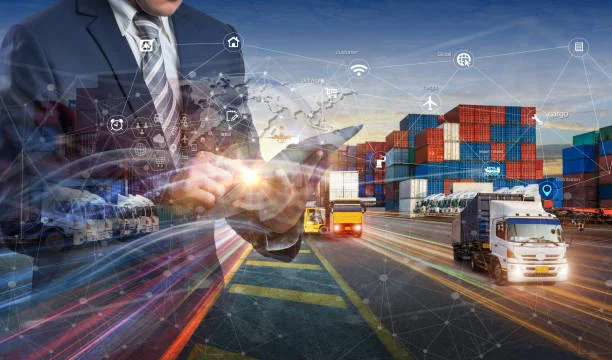A decade ago, logistics technology operations relied on spreadsheets, paper trails, and manual coordination. Today, automation, AI, and connected devices have turned it into a high-tech ecosystem where every delivery, warehouse, and truck speaks the same digital language.
What’s driving this transformation isn’t just speed, its precision, visibility, and smarter decision-making. Businesses partnering with logistics app development services are reaping the rewards of streamlined processes, real-time insights, and data-driven control.
Let’s explore how technology innovations are revolutionizing the logistics and supply chain landscape — and how your business can stay ahead.
1. Real-Time Visibility: Turning Blind Spots into Insights
In logistics, visibility is power. Thanks to IoT sensors, RFID tags, and GPS tracking, businesses can now monitor shipments from warehouse to doorstep in real time.
What it enables:
- Live shipment tracking and alerts
- Temperature and condition monitoring for sensitive goods
- Predictive rerouting to avoid delays
A Gartner study found that companies using visibility platforms reduce late deliveries by up to 50%. Real-time monitoring eliminates guesswork and gives logistics teams the agility to respond before small issues turn into disruptions.
Discover insights that complement your interests—dive into our related post now!
2. AI-Driven Logistics: The Smart Core of Operations
Artificial Intelligence (AI) has moved from buzzword to backbone in logistics. Machine learning algorithms are transforming how companies plan, forecast, and optimize every step of their supply chain.
AI in action:
- Predicts demand and prevents overstocking
- Automates carrier selection based on performance and cost
- Analyzes historical data to improve delivery accuracy
Custom platforms built through logistics software development services integrate AI directly into business workflows, allowing organizations to tailor insights, automate decisions, and cut operational waste.
3. Warehouse Automation: The Future of Fulfillment
Warehousing has seen a silent revolution. Robots, conveyor belts, and AI-driven picking systems now handle thousands of daily operations faster and more accurately than ever.
Benefits of warehouse automation:
- Reduces human error and fulfillment time
- Increases storage efficiency and throughput
- Lowers long-term operational costs
Even small- to mid-sized logistics companies are adopting affordable automation tools to compete with global giants like Amazon, which already employs over 750,000 robots across its fulfillment centers.
4. Blockchain: Building Trust Through Transparency
In global logistics, trust and traceability are everything. Blockchain offers a secure, decentralized record of every transaction and movement — ensuring that nothing can be altered or faked.
Why blockchain matters:
- Provides end-to-end shipment traceability
- Prevents fraud and counterfeiting
- Reduces paperwork and compliance delays
Industries like pharmaceuticals, luxury goods, and food logistics are leveraging blockchain to certify authenticity and boost consumer confidence. IBM’s Food Trust network, for instance, can trace food origins in seconds instead of days.
5. Predictive Analytics: From Reaction to Prevention
Predictive analytics takes logistics from “problem-solving” to “problem-preventing.” Using big data and historical trends, it helps businesses forecast future challenges and plan accordingly.
How it helps:
- Predicts demand spikes and supply shortages
- Identifies risk factors in routes or partners
- Enhances long-term capacity and cost planning
During disruptions like the pandemic, logistics providers using predictive models rerouted shipments faster, maintaining service levels while others stalled.
6. Sustainability through Smart Logistics
Sustainability has become both a moral and strategic necessity. With governments pushing carbon neutrality and consumers expecting eco-friendly practices, logistics companies are turning to green technology for answers.
Key innovations driving sustainability:
- Route optimization for reduced fuel use
- Electric and hybrid delivery fleets
- Carbon tracking and offset dashboards
- AI-based load optimization to prevent empty miles
Smart, sustainable logistics isn’t just good for the planet — it’s also proving to be good business. Companies adopting eco-tech see lower fuel costs and higher brand trust.
7. Cloud Technology: The Glue of Modern Supply Chains
Today’s logistics networks span continents. To keep them connected, cloud technology provides the infrastructure that allows data sharing, collaboration, and automation across multiple systems.
Cloud logistics advantages:
- Enables seamless integration between ERP, CRM, and WMS tools
- Reduces IT maintenance and downtime
- Offers scalability for growing businesses
Cloud-based logistics platforms make it easy to manage partners, suppliers, and customers in one ecosystem — ensuring everyone stays on the same page in real time.
8. The Human Side of Digital Logistics
Technology doesn’t replace people — it empowers them. The most successful logistics transformations combine automation with human intelligence.
Here’s how companies are adapting:
- Training teams to work with AI-powered systems
- Using analytics to enhance, not replace, human decisions
- Building cultures of innovation and continuous learning
When humans and machines collaborate effectively, logistics becomes faster, safer, and more adaptable to change.
What Forward-Thinking Companies Should Do Now
To keep up with evolving logistics technology, businesses should focus on:
- Adopting a data-first approach – Make decisions based on insights, not assumptions.
- Investing in tailored digital solutions – Generic tools rarely fit complex logistics operations.
- Integrating systems for full visibility – Connect warehousing, fleet, and inventory management.
- Going green – Optimize routes, loads, and vehicles to reduce emissions.
- Empowering teams – Provide digital training to ensure smooth tech adoption.
Every logistics company, regardless of size, can start small — by digitizing one process at a time and expanding as ROI becomes clear.
The Road Ahead: Tech-Driven Logistics for a Smarter Tomorrow
The logistics and supply chain industry is no longer about moving goods — it’s about moving information, decisions, and innovation at lightning speed.
AI, IoT, blockchain, and automation are not trends; they’re tools reshaping the DNA of modern logistics. Businesses that embrace these technologies early will set the standard for agility, customer satisfaction, and sustainability.
The future belongs to those who see technology not as an expense but as an opportunity to innovate, compete, and grow — faster than ever before.
Don’t miss out! Check our featured post packed with tips, trends, and fresh ideas.






